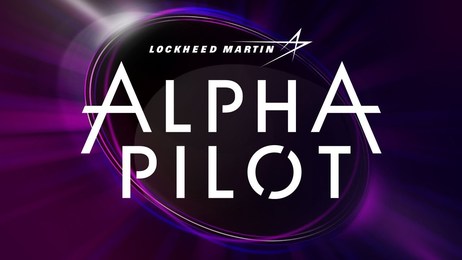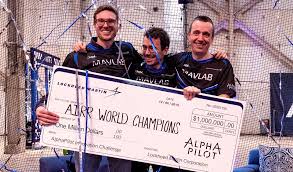Drone Racing Spurs Autonomous Flight Innovations
Published Feb-04-20Breakthrough:
$1 million-dollar prize accelerates AI innovation for high-speed drone racing.
Company:
Team MAVLAB, Netherlands
The Story:
 AlphaPilot lays claim to being the world's first large-scale open innovation challenge focused on developing artificial intelligence for high-speed racing drones.
AlphaPilot lays claim to being the world's first large-scale open innovation challenge focused on developing artificial intelligence for high-speed racing drones. The contest took place in 2019. Teams of programmers, engineers and pilots competed to develop fully autonomous drones with AI frameworks to fly against top human pilots on unique multi-dimensional aerial courses.
A total of 424 teams from 81 countries took part in a series of qualifying tests that were evaluated by a panel of industry experts. Following this, nine teams were selected for the race where drones competed against each other through high-speed aerial courses without human intervention, data relay, or GPS.
These finalists were given a kit of tools to help them push the boundaries of AI. Among the kit components were a custom autonomous drone and a modified version of DRL's [Drone Racing League’s] SIM.
The winners were Team MAVLAB from the Delft University of Technology in The Netherlands, who picked up a check for $1 million. They developed algorithms that drove their autonomous drone through the track with a finishing time of 12 seconds, which was 25% faster than the second-place drone.
"The AlphaPilot open innovation challenge is about going fast, taking risks and pushing the boundaries of AI and autonomous flight," said Lockheed Martin Chief Technology Officer Keoki Jackson.
"We are excited to recognize Team MAVLAB and award them with the $1 million prize, but the most energizing part of this competition is seeing how Lockheed Martin's partnership with DRL inspired great emerging global AI talent to help our world leverage AI and autonomous technologies."
Autonomous versus Human Pilot
After beating fellow competitors, Team MAVLAB took on one of the best human pilots, Gabriel Kocher, who competes in the DRL Allianz World Championship Season of pro-human drone racing. While they beat their own time by one second, they were far behind Kocher, who only needed six seconds to complete the course. Had they won, Team MAVLAB would've picked up an additional $250,000 in prize money.
Kocher may have come out victorious, but the gap between human performance and artificial intelligence is closing.
Real-World Applications
The combination of robotics and AI will not only change the future of sports, according to Lockheed Martin, but also lead to a fundamental shift in many other areas. The broader aim of the open innovation challenge was to advance the development and testing of these technologies for such real-world applications as tackling wildfires and orchestrating disaster and recovery operations.
Next Story »


